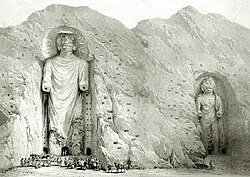Bamiyan
Jump to navigation
Jump to search
Bamiyan [alt. Bāmiyān] is the capital of Bamyan Province in central Afghanistan, about 70 miles northwest of Kabul.
The site is the location of the famous "Buddhas of Bamiyan" statues, along with a complex of several hundred Buddhist caves.[1] A large number of fragments of ancient manuscripts were discovered in the caves; many of these manuscripts are now in the Schøyen Collection.[2]
The Bamiyan Valley was a thriving Buddhist center from the second to roughly the ninth century CE.[1]
Jens-Uwe Hartmann states:
- Bamiyan is the name of a river, a valley, and a small town. It lies to the west of Kabul in the western continuation of the Hindu Kush mountains. In the first millennium C.E., the valley was one of the routes which connected the Indian subcontinent with the Silk Road in Central Asia. Apparently, it was this function as a channel for long-distance trade which brought the necessary means for establishing a Buddhist center and ensured its ongoing support.[3]
Further reading
 Buddhas of Bamiyan, Wikipedia
Buddhas of Bamiyan, Wikipedia- Nearly One Hundred 1,000-Year-Old Mysterious Manuscripts Discovered in Afghanistan, Ancient Origins
Notes
- ↑ 1.0 1.1 Robert E. Buswell Jr., Donald S. Lopez Jr., The Princeton Dictionary of Buddhism (Princeton: 2014), s.v. Bamiyan
- ↑
 Bamyan#Buddhas_of_Bamiyan, Wikipedia
Bamyan#Buddhas_of_Bamiyan, Wikipedia
- ↑ Bamiyan, In: Sarao, K.T.S., Long, J.D. (eds) Buddhism and Jainism. Encyclopedia of Indian Religions. Springer, Dordrecht. https://doi.org/10.1007/978-94-024-0852-2_38
